#disco Elysium analysis
Explore tagged Tumblr posts
Text
btw we do *get* that the worldbuilding of DE parallels the character's arc right? We understand that, right? That Our Guy commits all but a sliver of himself to the oblivion of amnesia in a moment where the only alternative he could see was suicide. And at the other end of that tragic attempt at self-annihilation he gets the chance to reinvent himself and overcome the longstanding, persistent habits that brought him to the cliff's edge to begin with. And that the world itself is presented as approaching an equally definitive precipice, with one of the richest characters in the cast even remarking that Capital is dead, and everything else being 20-odd years away from being swallowed by the pale
And we understand that the pale is forgetting, right? Right? It's informational entropy applied to the world, facts and events and places and memories being destructured and obliderated, reduced to an indistinct soup of whispers, past present and future. That it emerges from humanity's collective inability to imagine a future beyond moralist capitalism, and that this inability to see the horizon inevitably metastazises into Mesque's accelerationist nihilism that ultimately destroys the world. [starts shaking you] WE UNDERSTAND THAT RIGHT??
That the game's splash screen is a view from the bay of Revachol, from the deserter's island. And we know what it shows, right? Revachol, in the distance. And beyond that what? A horizon? No! It shows Pale. Because that's his perspective. Because he has abandoned all hope, lost all sight of the future and has committed to self-annihilation. For him the entroponetic collapse is imminent. We see that, don't we?
That the game is a thesis on hope. That the world has the chance to reinvent itself from the precipice of oblivion just like Harry does, and that the only thing that can do that is imagining the future. A future. Any future, and making it. Piece by piece, day by day, committing to it, and refusing to give in to despair and nihilism. We understand, don't we, that there must be no truce with the f-
you know what, nevermind...
#disco elysium#elysium#sacred and terrible air#püha ja õudne lõhn#za/um#any magic system worth its salt is obligated to reinforce and reflect its story's themes#otherwise what are we even doing#cheap literary analysis with preda
957 notes
·
View notes
Text
One of the best things about Disco Elysium by far is that it does not fear ugly women. The world is full of ugly men, but ugly women are so hard to come by.
#I'm not calling the characters ugly btw#i don't believe any one can be ugly#i do not care for beauty standards and thus i don't rank people based on how “ugly” or “pretty” they are#but the characters in DE do not meet the conventional beauty standards and look like actual people with unique faces#and thus would be considered “ugly”#and that is so important to me. i go feral whenever media represents how people look like in real life and not how they look like in the#fictional parallel universe where everyone is a model and where a majority of the movies take place#because irl you don't have to be a model to be desirable#the most attractive man in any video game I've ever played has a receding hairline and a big nose and thick glasses and a small chin#and not only is representing realistic people. just good. in general. but it makes the character of Dolores Dei stand out so much more which#works for the game so well. she's barely human. she's a deity- a myth- a legend. the only version that exists of her now is the one with#glowing lungs. she's perfectly beautiful because she's inhuman. the fact that everybody else looks so human only highlights how inhuman she#has become yk?#if everyone was as conventionally attractive as her then she wouldn't stand out. we wouldn't get why she's so special.#disco elysium#disco elysium analysis#media analysis#beauty standards#this is only one aspect of how this game portrays real people btw. as someone interested in character design this just immediately stood out#to me#the first time i noticed it was when i first met garte and the second time was when i met ruby because neither are conventionally desirable#oh my fucking god the nerds who complain about a woman with a model face having body hair in a video game would perish if they played this#mainstream game/movie studios catering to western masses could never
354 notes
·
View notes
Text
Finished playing through Disco Elysium again (basically a winter tradition now), and the main thing I'm taking away this time is that Harry, primarily pre game Harry, actually sounds quite intimidating/scary. I'm so used to inhabiting him and guiding his actions, and it's hard from the player's POV to not see him as just kinda pathetic. Trying to imagine it from another character's perspective though; he's big, still really strong and athletic despite being a husk of a man coming off of a bender, unkempt, unpredictable, verbally abusive, under the influence all of the time, casually uses his firearm, might be connected to organized crime (though I think that's false but still), and to top it all off has a reputation as a human can opener. I'd kind of not thought much about the Slyvie convo before now, but I don't think she's alone in being scared of him. Ofc Martinaise is a really rough place so he doesn't stand out quite as much.
It's interesting to think about, I'm so used to looking at him as just a sad sack!
101 notes
·
View notes
Text
Lt. Kim Kitsuragi and the pale-

Warning- it's insanely long.
1. After life, death
One of the first thing you can learn about Kim is that he would hurl himself in death's way to save you. From the very first moment, Kim is related to sacrifice and death, it follows him wherever he goes-

The slaughterhouse.
He lost his parents at two years old. He worked a year in Processing (here's good post about that by @renmorris and @spilledkaleidoscope). He lost his partner, Eyes. People have taken a bullet that was meant for his more than once. His survivor's guilt is insane. He's killed six people. He's afraid of killing recklessly, and has a deeply unhealthy relationship with his gun (made another embarrassingly long post about that).
Kim also hears pale 'ghosts' on the police radio all the time, and talks about it like it's normal, and says he doesn't believe in ghosts.
If harry is with Noid during the Moralist dream quest (more on it later), Harry can even wonder if Kim is a ghost, prompting this beautiful exchange-

And he's not entirely wrong. When Harry gets shot, after Kim fulfills Espirit's promise he'll stand in death's way for him, you can ask as you fall into darkness what will happen to you-

It's the living who are ghosts. You can leave them behind and rest. Go into the wild pale yonder, along with everyone else Kim has ever cared about. Or at least you can try to.
When death is at the door, you have two options-

2. After death, life again

Kim might associate himself with death, but Harry associates him with life again and again- Death is darkness, Kim has a light bulb halo. Death is a sunset, Kim is a sunrise. Death is where you are when the game start, it's ready to take you, and then- a clarion call, the sound of a motor carriage, a detective arriving on the scene, and you open your eyes.


The game is very clear about Harry being a ceaseless agent of the world (here's a good compilation by @junawer) but he's not the only one. Harry stands at death's door twice, and Kim is his way back to the world both times.
3. After the world, the pale


So what is Kim's relationship with the pale?
As casual as he might try to appear, Kim is clearly uncomfortable with the pale, attempting to protect Harry from it. When Harry brings up the pale, he intervenes, genuinely worried for the fragile stability of his mind.

It's no more terrifying than water or death or that we're stuck behind our eyes for all eternity?? Sounds pretty terrifying Kim...
The key is in the moralist vision quest, When Harry attempts to each the Committee of Responsibility, and he hears the pale crosstalk coming through the radio, when suddenly-
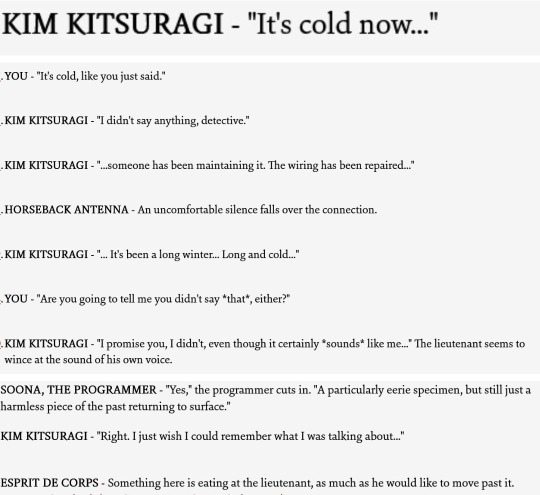
"Pale is a shroud of memories and it doesn't really distinguish to whom those memories belong to. You could hear anything." You could hear anything, but you hear Kim. If he isn't with you, Soona even says that the odds of us hearing him, out of all the voices in the pale, are astronomically low.
We know the past has not been harmless to Kim, we know it's full of ghosts and cold winters, but that's not the thing that's eating at him-

Kim is afraid of forgetting. He's constantly writing, he thinks through his notebook, always recording, so he wouldn't lose anything. That's why the pale is so terrifying.

4. After the pale. the world again
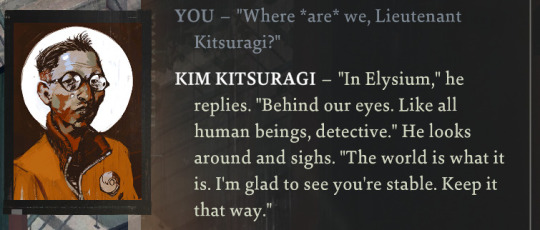
The world is what it is. God is in his heaven. Everything is normal on Earth.


Volta do mar is a skill unique to Kim, according to the stats of this pilot jackets-

It makes sense, seeing how the only real advance in pale transit is the speed with which an aerostatic craft can pierce it.
His Black jacket is a bit more complicated-

DISTANT ENEMY OF HIMSELF?? kim.... The connections to Seol is intriguing here, considering how Kim tries to distant himself from it. I'm also not sure what 'sitting down for volta' would mean in this context, would love to hear some of you guys' thoughts.



It's driving me crazy to think how Kim wanted to be pilot as a kid, and is walking around dressed like a pilot as an adult, to give himself the ability to navigate the pale. To return from the sea and fulfill the role he has to play in the world, the thing Harry thought about a million times-

But we know Kim has a bigger role to play, he's trying to do his part right now, convincing Harry to stay-
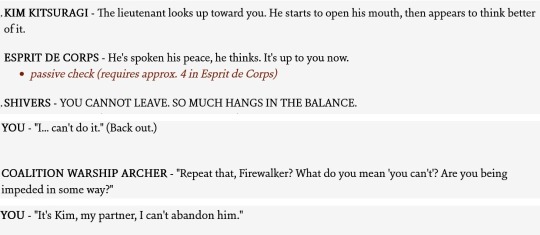

His connection to Harry can keep him on this world once again. Keeping the two of them together. Your real work is down here, both of you-
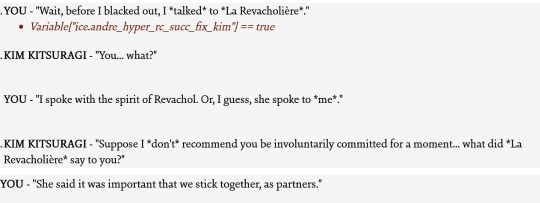
Kim was right, each of them has a role to play in the world, but it's not a minor one. Him and Harry are Revachol's only hope. If they stick together they could keep her on this earth, stop the end of the world.
UNITY AMONG THE RANKS IS PARAMOUNT.
I NEED YOU. YOU CAN KEEP ME ON THIS EARTH. BE VIGILANT.
I LOVE YOU.
#disco elysium#disco Elysium meta#kim kitsuragi#harry du bois#disco Elysium analysis#the pale#truly i have nothing to say for myself. this took me so long and i didn't even notice the time going by. this game is haunting me#i submitted an easy for college yesterday that took me less work. but i had fun so#🏺#de#de meta#de analysis
88 notes
·
View notes
Text
Generating plasm and stacking matchboxes: how to build a better future through collective consciousness.
Alternatively - Steban and Ulixes were building Tatlin's Tower so I have to talk about the symbolism or I will explode!!
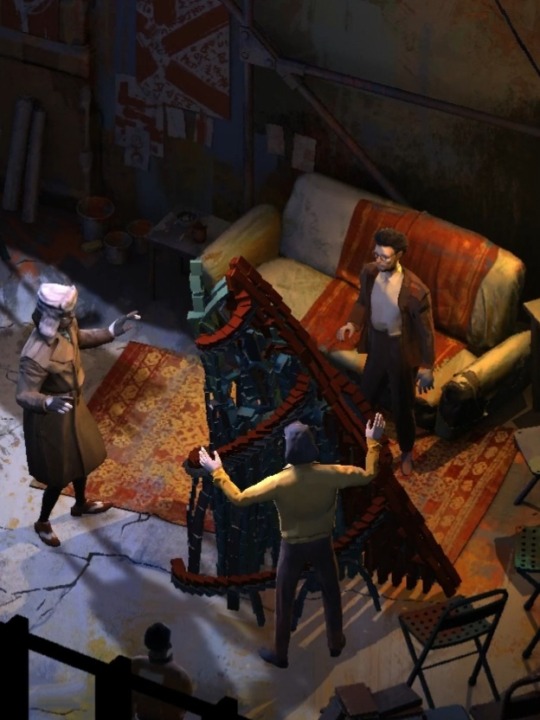
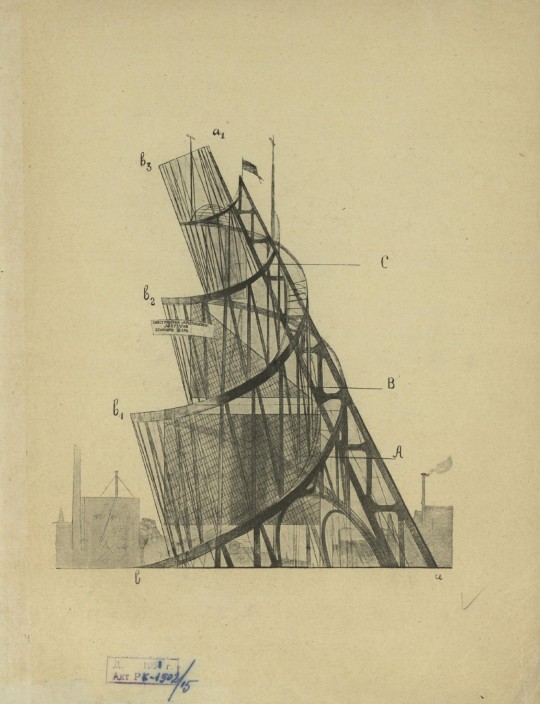
While completing the communist vision quest you get an opportunity to build a model of "The Tower of History", depicted on the last page of "A Brief Look at Infra-Materialism": a leaning tower wrapped in a dramatic helix. The scale model you make is a mirror image of Tatlin's Tower - a design for a grand monumental building to the Third International: the government organization advocating for world communism.
The main idea of the monument was to produce a new type of structure, uniting a purely creative form with a utilitarian form. Meaning it would function as an office building while also serving as a symbol of cultural significance. And let me tell you, this bad boy can fit so much symbolism in it.
Tatlin was commissioned to develop a design in 1919, after the 1917 February Revolution - a parallel to Disco Elysium's Insulinde we're witnessing post-Antecentennial Revolution.
Tatlin's work was inspired by high revolutionary goals, which are evident in the visual direction of the tower as well, expressing the ideological strive for achieving something that has never been done before, overcoming the odds. The structure "oscillates like a steel snake, constrained and organized by the one general movement of all the parts, to raise itself above the earth. The form wants to overcome the material and the force of gravity..."
The tower has meaning packed even in the materials. For example, the glass structures (marked A, B, C on the architectural rendering) were meant to serve legislative, executive and informative initiatives while rotating around their axes at different speeds. The material signified the purity of initiatives, their liberation from material constraints and their ideal qualities.
But here's the best part. The spirals.
"The spiral is the movement of liberated humanity. The spiral is the ideal expression of liberation: with its base set in the earth, it flees from the ground and becomes a symbol of the suspension of all (...) earthy interests." They are "the most elastic and rapid lines which the world knows" that represent movement and aspiration, continuing the themes of progress and freedom, but they also refer to something else.
In the process of building the matchbox model Rhetoric points out: "It's almost exactly as Nilsen's sketch imagined, a physical manifestation of the dialectical spiral of history."
The shape of the tower is a representation of dialectical development of history, first visualized as a spiral by G. W. F. Hegel. He pictured transformational change as "both linear and circular in order to be short-term responsive, i.e. possibly negating itself, and long-term strategic, i.e. a process of development."
Hegel's dialectics would later be reinterpreted through the prism of materialism by Marx and Engels to create dialectical materialism - the basis for historical materialism.
"Still, this idea, as formulated by Marx and Engels on the basis of Hegels’ philosophy, is far more comprehensive and far richer in content than the current idea of evolution is. A development that repeats, as it were, stages that have already been passed, but repeats them in a different way, on a higher basis, (...) a development, so to speak, that proceeds in spirals, not in a straight line; a development by leaps, catastrophes, and revolutions; (...) the interdependence and the closest and indissoluble connection between all aspects of any phenomenon (history constantly revealing ever new aspects), a connection that provides a uniform, and universal process of motion, one that follows definite laws - these are some of the features of dialectics as a doctrine of development that is richer than the conventional one."
The tower embodies progress in materialist understanding of history while also indicating the connection to ideological plasm, a manifestation of "the proletariat's embrace of historical materialism", necessary to create a better future.
According to Nilsen, the proletariat of a revolutionary state can generate enough plasm to create extra-physical architecture that "disregards the laws of 'bourgeois physics' and instead relies on the revolutionary faith of the people for structural integrity."
This function of plasm implies that The Tower of History can be created only under revolutionary circumstances - without a sufficient amount of plasm even the matchbox model didn't stay up. The exact same sentiment is expressed about Tatlin's Tower: "We maintain that only the full power of the multimillion strong proletarian consciousness could bring into the world the idea of this monument and its forms. The monument must be realized by the muscles of this power, because we have an ideal, living and classical expression the pure and creative form of the international union of the workers of the whole world."
Nilsen called it "the highest expression of Communist principles, a society whose literal foundation is the faith of its people."
Tatlin's Tower was a symbol of faith in the revolutionary future, the global triumph of Marxist socialism. A monument "made of iron, glass and revolution."
It was never built in real life, and neither was The Tower of History in the world of Elysium.
But you can try to see if there's enough plasm between the three of you. And the matchbox tower stays up for a long moment, quivering with an improbable energy. You believe it can say up - and it does.
So you have to believe; whether it's for collective action or generating ideological plasm. Then, together, maybe you'll be able to build as much as 0.0002% of communism.
#i tricked myself into reading leftist theory for disco elysium#never thought i would be reading Lenin to write about videogame worldbuilding#tower related quotes are from ''The monument to the Third International'' by Nikolai Punin#infra-materialism#disco elysium#de#de meta#disco elysium analysis#disco elysium spoilers#disco elysium meta
683 notes
·
View notes
Text
I may be wrong to compare these two concepts since I haven't finished the game yet and don't know much about the pale but everything I haveread about it reminds me of the whole "Death of God" thing Nietzsche had going and what he called "the wasteland".
"But Nietzsche, who claimed that the death of God could open new exhilarating, but also terrifying possibilities for humans, was aware of how an impossible task this was. That is why he described the aftermath of the death of God as a "wasteland" - a wasteland that spreads everywhere and makes human life empty and meaningless. The death of God becomes the death of man. Man is guilty of killing God and this guilt in turn kills man."
"Has the death of God made man freer, happier, more rational or more ethical? Nietzsche doubts it and introduces what he calls a "wasteland" that expands. The "wasteland grows" inside us, in the outside world, in nature, in human relations or whatever is left of them. It encapsulates everything from Hiroshima and the Holocaust to the massacre of hundreds of thousands of human beings in Serebrenitsa, Rwanda, Halepce, Hama, Khums and Aleppo. The "wasteland grows" and we can do nothing about it. With all the sophisticated technologies, precision bombs, satellite communications, we cannot stop it. We have become the wasteland."
"We do not have to take Nietzsche's path and settle for a sophisticated nihilism to overcome the death of God. Instead, we need to look for ways to reclaim our humanity and rediscover the deeper meanings of reality. By connecting to a higher principle, we do not diminish or give up our humanity. To the contrary, we substantiate and enrich it. We open ourselves to new possibilities that protect our agency and freedom and maintain meaning in our lives.In contrast to the romantic humanists and Freudians, this view of humans presents them neither as angels nor demons, but as beings who have the potential to become either one. Endowed with reason and compassion on the one hand, and a carnal soul and destructive force on the other, humans have the free will to move in either direction."
-Death of God or death of man?, Ibrahim Kalin, Daily Sabah
“The World, men find, is not just out of joint but tumbling away into the nothingness of absurdity. Nietzsche, who from his supreme peak saw far ahead of it all … had for it the simple, because thoughtful, words ‘The wasteland grows’”
-Martin Heidegger, What is Called Thinking









Entropolism (Pale accelerationism) in Disco Elysium
Art: Agostino Musi, The Skeletons, 1518 // Pieter Bruegel the Elder, The Fall of the Rebel Angels (detail), 1562 // víctor m. alonso, viaje al infinito, 2021 // Driss Ouadahi Gentle Breeze, 2016
Disco Elysium dialogues: Paledriver // Joyce
#man i still like philosophy#disco elysium#de meta#disco elysium analysis#de#THE PALE#this is mostly for myself#PHILOSOPHY TIME
2K notes
·
View notes
Text
Guess who made even more of these stupid things
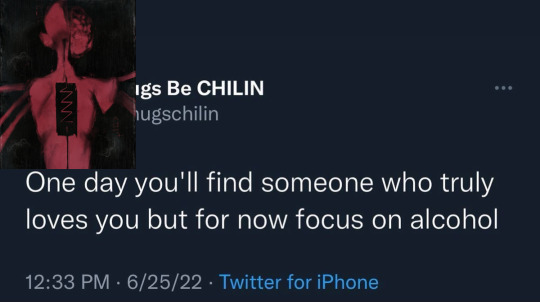






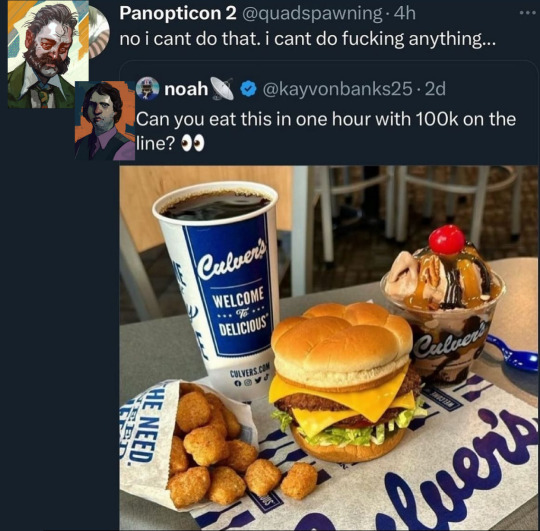


#it’s all I’m good at I guess#this and the occasional character/lore analysis#I’m not sure about some of these but whatever#I tried to include more variety but the same couple freaks kept applying#disco elysium#harry du bois#jean vicquemare#judit minot#kim kisturagi#trant heidelstam#steban the student communist#he has a tag???#lawrence garte#fuckass name#lawrence#klaasje amandou#cuno de ruyter#cunoesse#she has a last name I think but I don’t remember it#kimharry#does this count#I’ll tag it anyway#call me mañana
2K notes
·
View notes
Text
The portraits of Neha and Elizabeth Beaufort: an analysis
By me



At first glance it was easy to observe the clear inspiration Neha’s portrait had of “the girl with the pearl earring”, however we can somehow feel this when looking at Beaufort’s portrait.
But the deeper we look into their character, the more we realise how opposed they are to each other, representing her inner character.
our first encounters
In both cases, you don’t know them for who they are, but you are introduced by what they are, “the novelty dice maker” and “the gardener”.
You get to later know their names, you might only know one for Neha but it doesn’t distance you from her, quite the opposite it feels like a nickname.
Learning Elizabeth Beaufort’s full name distances you from her, she is now a title, a figure of authority.
Neha is hidden, and if you wish you can even decide to go the whole game without seeing or talking to her. But Beaufort? She is centric to the story, you have to talk to her, she is one of the first characters you see when you go outside, one of the first that helps you in the examination process with the ammonia and gardening gloves.
the girl with the pearl earring
while we can see it clearly for Neha, it feels more vague for Elizabeth.
Neha’s head covering is worn in a more modest and classical manner, her pose practically identical to the reference, she symbolizes the “old” what was once. An art piece and aspiring individual of her time. The way her portrait is painted is very academic, there is very little use of dark outline if ever. Everything about it is almost soft and comforting.
In contrast Beaufort’s portrait adopts a widely different, almost provocative pose, the way she wears the headgear covering less for instance but attaching her hair, prioritizing practicality over appearances. There is a more modern touch to her portrait, the colours are saturated and there is a bold dark outline, she is defying the traditional. She represents the “youth” of Martinaise.
While Neha resembles almost identically to the portrait, Beaufort distances herself from it, the past but still she finds a way to keep a part of it, what made her what she is, and then turn it into something personal.
In both of their portraits, the background is applied similarly for the taints and almost like they were mirrored vertically, however Neha’s are softer, almost like they are fading away, while Beaufort’s are high in contrast.
the postures
The novelty dice maker, upon your first meeting with her, is turned away from you, she’s working, she stills open herself to you, as she presents her arts and studio in an almost familiar way. You enter her domain of creation, you’re inside her soul. Maybe you could picture it sort of like a confessional, there is intimacy between the two of them and they won't necessarily need to face each other. She looks at you from the side, seemingly making you feel as though you were disturbing her, and yet she is not. But she stills look at you from above, this could be referring to the fact she was up, high in her workshop’s room while the crime scene was unfolding, not only this but she “disregarded” it when it was happening, as she had one of the best view on it, and yet stayed absorbed by her art.
On the other hand, Beaufort is facing forward all time, she’s observing your every move, she looks up at you, from beneath it is easier to see all (visual calculus check “gardening in march”, you point out the fact she is stationed at the best spot to keep tabs of people). She looks at you with an interrogative expression, she was expecting you to be here, to talk to her. She shields herself from you when she crosses her arms or when she hides her real identity from you at the start by going as “the gardener”, she makes you believe that you are someone above her, and you believe it. She is always in a public space, never once alone, she is either outside or in the Whirling-in-rags. There is no intimacy, if even a way to talk to her as “Elizabeth” instead she is “a member of the union”, this could also be reflected in her looking upward, as stated earlier, as she is in the middle of a hierarchy in the Union. Her purpose is to exonerate the Union of the presumed crime, “the Union fixer”. She is cleaning up the mess caused by the Union’s dogs. Even if there is a “box” reminding of a confessional where the Hardie boys stay, it is, not only a long process to get them to confess, she is the first to stop them when they open up, but you are also constantly observed by the public, not only her but the people at the Whirling.
Knowing this, Neha also found herself “shielded” by the entrance of her studio, though it served an entirely different purpose as it can always be opened. Beaufort wears different masks that you can’t take off as you talk to her, but rather break by any new dialogues you have surrounding the case, there is no way to get under her skin without making her reach a breaking point. They are facing opposite directions, Neha leaned toward the past, Beaufort toward the future, but they both look in your direction: the present.
No matter their difference, both of them wear blue clothes, this reflecting their social class, they're both born blue collars, even if Beaufort wears a white shirt, representing the purity of her youth and her future aspirations, she works for the union, the symbol of the working class, she represent them on a legal point of view, as a lawyer. Her jean strapped overall partially visible in her portrait also can remind of a tank top, or “débardeur”, which could be an echo to the organization she works closely with, the dockworkers union” or “débardeurs’ union”. Elizabth’s softer features in comparison to Neha’s sharper ones also amplifies this duality of “youth” vs the “old”.
the lightings
Beaufort’s portrait shows a significant amount of green on her forehead, associating blue and yellow, blue symbolizing intellectual skills and yellow motorics, this is her mindset. However the right side of her face is lit in dark red, which can be associated with physique skills, indicating her short temper she tries to hide. The fact it is cast on the right side of her face could imply that it is her “real” face, what is “right”. In her eyes and her nose you can also see a reflexion of light that Neha doesn’t have, echoing to her “ bright and hopeful” futur, the fact she is highly regarded by her peers, but also maybe her more emotive tendencies, not in a derogatory way, but more in a youthful ardor, defending her ideals.
For Neha, her yellow, we could even say gold lighting highlights what she is handling right now, her works, her art, that is what is important to her, she is what she creates, her face being cast in the shadow. This choice of colour for the light might be associated with motorics skills knowing she is a dicemaker. The light could also represent the future ahead, the change in the world, the “miracle – from the northwest”. She is averting her gaze from it. It is too late for her.
#disco elysium#de#analysis#artistic analysis#portrait study#elizabeth beaufort#Neha#the gardener#novelty dicemaker#short essay#maybe#I'm not sure if it can qualify as such but whatever#it was fun to make#i love disco elysium sm#the girl with the pearl earring#art#discoposting
267 notes
·
View notes
Text
(yap incoming 💥💥💥)
I don't think we as a fandom talk enough about how both Kim AND Harry both had dreams of working in fields related to the Pale as children and how that interest carried on through both their lives.


As stated, Kim wanted to become an aerostatic pilot before becoming an RCM officer. Aerostatics were specifically designed to traverse the Pale, and in game Kim wears an aerostatic pilot jacket, despite not being a pilot.
On the merch website, (which, would not recommend supporting, but I'm putting this in as a little tidbit anyways-) we can see the actual stats + description for Kim's jacket.

It's clear that Kim still holds onto this dream and admires the pilots and the revolutionary brigade. He's also a huge torque dork, so I think it's safe to assume he's carried the fascination with aerostatics and machinery well into his adulthood. (also, Airman Kitsuragi.... I'm going to burst into tears. I'm so serious)
Now, as for Harry, I don't have that much info on. HOWEVER,

So, entroponetics is the study of the Pale. At some point when Harry was a child, before becoming a gym teacher, Harry wanted to be a Pale scientist.
(also, writing poetry is a tactic used before traversing the Pale to keep a stable mind. AKA: Volta do Mar.)
And just like Kim, that interest carried on as an adult.
NOW. Okay stay with me. I've just been thinking of the possibility of Kim and Harry meeting, except Kim is an aerostatics pilot, and Harry is a entroponologist. I have no idea if this is an original idea or if this is even coherent but. There are so many worms in my brain
#i really want to write a fic about this#would yall fw that...#theres probably plenty of reasons why they didnt follow these dreams but#let me have this anyways#text post#analysis#disco elysium game#disco elysium#harrykim#kimharry#harry du bois#kim kitsuragi
149 notes
·
View notes
Text
Ok this may be a little strange but I noticed something in Arcane Season 2 and as both fan of Arcane and Disco Elysium I want to show you these similarities between the two because oh my god First in the opening the shadow behind Caitlyn reminds me of the Volition


The description of this skill states:

But then, it adds

This is what is literally happening to Caitlyn's psyche, she's losing her Morale, she's falling apart becoming somethings she was trying so hard to fight obtaining nothing if not loss and a void in her chest that cannot be filled anymore. And there she is, choosing violence, choosing war because she learned this is the only way, she totally lost what she believed in and an important pillar in her life, her mother. The other thing is..this scene, that reminds me of the Island Empire


This entire sequence reminded me of the description of this skill

The reality twisted different version of Jayce, Heimerdinger and Ekko appeared, every object made by hextech twitched as if that wasn't their reality anymore, cannot exist anymore in space and time. But what is this thing that caused it?


Viktor and Jayce played with something so bigger than them, and it was great, was amazing they saw potential..not actually knowing what they were getting into and only when it was too late they realized what they had started, the irreversible corruption of the world, of the one they cared about, of themself.

I love I LOVE this series.
#Arcane#arcane season 2#disco elysium#jayce talis#caitlyn kiramman#viktor#my screenshots#analysis#sorry for my english i tried to pull something out#i know this is only in my brain but the brain brained in an amazign way im so happy
176 notes
·
View notes
Text

I AM LA REVACHOLIÈRE.
I AM THE CITY.
#3am art#disco elysium fanart#disco elysium#la revacholiere#i have no idea how to cw this#cw veins#cw organs#only kind of??#okay so ive been thinking a lot about la revacholiere#like a lot recently#and i came to this sort of eureka moment about her#she is the circulatory system/literal HEART of revachol#her hundred thousands of luminous arms?#veins across the city#every step taken by the people of revachol is blood pumping through the veins and keeping the city alive#symbolism my beloved.......#this feels like surface level analysis#but she means a lot to me
109 notes
·
View notes
Text
Something I've yet to rant about is the inherent sadness and misery of post-tribunal disco elysium. Of course it will *feel* different each time depending on the outcome, but I think I had one of the worst one of all. Everyone fucking died, I didn't have a gun, and I failed all but two skills checks. One of them had a 97% success possibility, so it was almost impossible to fail *that one*. Safe to say it was a shit show. When Harry wakes up, Kim is tired. He is running on his last drop of fuel and he is *so* close to done, but he is Kim Kitsuragi, the entire RCM's finest, he doesn't give up. Still, the air in the post massacre streets of Martinaise feels thick with defeat. Everyone has fucked off, closed off. People are only left with a burning memory and the task to accept what happened, because there's nothing to be done now. The choices you've made snicker at you trying to accept the consequences now. You will never know if you made the right decision.
Not only that, but this game doesn't let you forget for a second, that Harry is severely wounded. When he sleeps in the flak tower it is mentioned multiple times that his wound is bleeding, the game makes a point to comment on how his pelvis hurts, how it's hard to run... and in the final cut scene, the Finale, Jean outright says that Harry is actively bleeding everywhere. This game doesn't let you forget what the character has been through, wounds don't heal when the health bar is full.
Harry has been a broken man from the beginning, not even the beginning of the game, but the post-tribunal gameplay doesn't play along to his madness anymore, it has given up on the fanfare. The tie stops talking and something within me compelled me to turn down on the out-of-pocket replies. It didn't feel appropriate anymore and honestly, it didn't feel like the same game anymore. All that is left is the death and misery present all around him, not contained to inside him anymore. Martinaise is a district that has had to go through the worst, but *it* has learned to cope. Now it just needs time to get back on its feet again. But Harry... Harry is down low, but he's still going. He's not going to take the time to get back on his feet until he's forced to, I think. This pitiful relentlessness only highlights how truly fucked everything in the moment is.
Disco elysium is truly a wonderful game for portraying this misery so bone-chillingly. It forces you to feel the last bit of hope they chased. The ending, the confrontation with his past, can only be described in a word I don't know the English translation for. I don't think it exists.
Õõvastav. The ending is exactly that. Harrowing is the closest word I could think of.
#disco elysium#disco elysium spoilers#harry du bois#harrier du bois#kim kitsuragi#disco elysium analysis
146 notes
·
View notes
Text
As much as I love Disco Elysium, I think I was not prepared for Sacred and Terrible Air. Of course, I was expecting to know more about the world of Elysium as a whole, and Robert Kurvitz is a very good writer, but the thesis of the novel (and how it makes its points) flash-banged me.
Disco Elysium this is not, and it wasn’t supposed to be, but I think I can understand better now what the team at ZA/UM was getting at with this specific setting, and these specific narrative angles. Kinda messy, because it’s been a week since I finished it, but here are some things I’d like to highlight:
1. The pedophilia. I surely wasn’t expecting this to be such a central theme of the novel, but a lot of its main points revolve around it. The most interesting use of this, as a narrative device, is how the girlfriend of Jesper basically accuses him of being a pedophile because he cannot relate to the adults around him. He’s still obsessed with a girl he met when he was 13 years old, and fetishizes a scrunchie he stole from her bag two decades ago. Yeah, I guess Jesper, well into his thirties, is still in love with a 13 year old girl. His girlfriend is almost half his age, and they started dating when she was 15 years old and a lingerie model (!). Zigi mentions how pedophilia was a bougie disease, and well… That idea went right into my thought cabinet (I call it “Bougie Babies for Sale).
Still processing it.
Now, let’s go back to the rest of the main characters. With all this in mind, a pedophilic overtone covers their interest in these four missing girls, but Jasper is the only one who acts on it, sort of. Khan remains in a sort of arrested development (he still uses a shirt he had when he was 13), foregoing normal adult relationships, and Tereesz joins the police as an investigator with the idea of still finding them some day (essentially letting these eternally prepubescent girls define his entire existence), leading him to a very dark path. I wonder if the brutality they afford to the “actual” pedophiles in the story (Vidkun Hird and the Linoleum Salesman) comes from the realization that they are not that different?
2. Obviously, though, this fetishization of the Lund sisters is also a fetishization of the past. The novel states it in the first few pages; they disappeared twenty years ago, in a time that most conservative people remember as the “good old days”. Basically their version of the American Fifties. Now, being obsessed with the past is a running theme in both SaTA and DE, but the angle here is different.
I already said it: the past is not remembered, is fetishized with an almost sexual yearning by a lot of the male characters of the book. They want to be consumed by it (and lucky them! It will) and do nothing more than serve it. It reminds me of a poem by Yamil Nardil Sadek, which, translated to the best of my ability, goes like:
She awaits me
sitting on the bed,
wearing leather,
and armed to the teeth,
the Memory.
Yeah, that sums up Sacred and Terrible Air pretty well. Everyone is being consumed by the past, bite by bite, and enjoying it. Vidkun Hird, by the mythologized version of his tribe’s history; Sarjan Ambartsumjan, by a miniature ship model that requires constant, devoted thought or else it will disappear, the three main characters by the memory of that summer with the Lund girls. Even the Linoleum Salesman is being haunted and consumed, of sorts, by his sickness and dementia that only sometimes let him take a peek of the past. Beyond that, there are very few characters that do not spend time being followed by relentless ghosts. Literally, in the case of Zigi. Which brings me to…
3. The Pale. It was a really cool concept in Disco Elysium, and it’s an existential nightmare in Sacred and Terrible Air. It always was, really. But here it lets you take a look into it in a way that’s applicable in real life. The Pale is a metaphor for many things, but actually for a single one: A world where our current Capitalist reality facilitates both apathy and yearning for better days, often idealized in our collective pasts.
My favorite scene, one that was incredibly puzzling but so obvious in retrospect, is a beautiful speech by the ghost (?) of Ignus Nilsen to Zigi. I will just paste it here:
“I said terrible things, yes! I stood on a white horse, in a blizzard, and gave speeches. In the mountains, on the construction site… I swung my sword, with silver sunbeams on the hilt. And all around me fluttered white flags, crests of crowned horns made with silver thread, a pentagon between the prongs of the horns, the branches raised to heaven. Everyone who came here with me became happy, Zigi! Communism is powerful! Believe in Communism, it’s a burst of enthusiasm! I promise! It’s beautiful when you believe in a person, but without it…!”
“Without it, there is nothing.”
“Nothing. It was a blizzard, but it was bright, it was morning. Communism is white, it sparkles! Communism is the morning, it is a jubilation!”
The Pale begins to recede dangerously around the entroponaut.
The fucking Pale recedes with talk of Communism! At first it might appear a little heavy handed (yeah, Communism, by itself, could save the world). But then I got into how Communism could be a solution to the antipathy and chronic nostalgia that sustain Capitalism, and then it hit me. Nilsen, a literal ghost from the past, is talking about a future that could have been. That he wanted to accomplish. That people, probably, can still achieve. The Pale is not eternal, it can be pushed back. Because the Pale seems to subsist on the past, it abhors any talk of the future. A better future. That’s how we solve things, and for a central thesis, is not bad at all.
With that being said, and because I’m just rambling here while pretending I’m working, there are also some things that I just didn’t understand, but maybe it was because of the translation. The original novel is written in a very poetic style, and some of that is still here, but I still need to untangle…
1. The Man. It is said that the day the Lund girls disappeared, they were joined by a mysterious Man that nobody seemed to remember correctly. A character even suspects that she was remembering wrong. Now, the Pale erases people and memories retroactively, so maybe it had something to do with it, but… Who was that? Is there any theory about that Man, or I just missed something? Some scenes and narrations were tough to parse for me (my primary language is not English).
2. Was Malin Lund pregnant? That flash with the fetus was sudden and weird.
3. What was the significance of the three meat piroshkis? They mention that it was unusual that the girls bought them (and if you do the math, you can realize early on that they were not planning to get back home. That purchase didn’t leave them enough money for the bus fare back), but that’s it. Were they for the Man? Also, the narration mentions that Lund girls’ picnic basket contained “the kind of things girls like to eat”, so maybe they were planning to see the boys and bring them the kind of things boys eat? I’m overthinking that? The chapter actually titled “Three Meat Piroshkis” just left me even more confused.
4. I don’t understand how Khan’s pen works at all. The one he brought to the school reunion. That was the part I re-read the most. Anyway, even with that, I loved Sacred and Terrible Air. Definitely one of the most enthralling reads I had, with or without the background of Disco Elysium. I’d still like an official translation that could potentially solve the issues I had, but for now, a Top 10 Book for me.
Go for it now.
392 notes
·
View notes
Text
I’m fascinated by how variations of Sea Power's “Want to Be Free (Remix)” provide a musical theme for death and endings that follows Harry and his foils throughout Disco Elysium.
The first place you hear it is as “The Field Autopsy” while inspecting the Hanged Man’s body. It's barely recognizable as the original song, though. It's sluggish and muddy and bilious. The piano melody has been lowered and sustained to an ominous funereal organ and combined with deep strings. A lilting viola line in the lush layers of the original "Want to Be Free" is isolated here and contrasts with the low organ, rising like the stench off a corpse. If you do the autopsy first thing as Kim suggests, Harry – freshly, grotesquely awakened from his apocalyptic bender – is not in a much better state than a corpse himself.
The music underscores a visceral scene of death and decay, our introduction to the Hanged Man, the first of Harry's foils. Both Harry and Lely are agents of state-sponsored violence as a cop and mercenary, respectively. They bear similar physical scars from the neglect of the systems they grew up in. They both desperately want to escape the horrorshow of their lives, using drugs and dark fantasies to cope with the terrible things they see and do but finding little more than self-destruction in the nihilism. The Bloated Corpse of a Drunk taking the Hanged Man's place in Harry's first night dream makes their connection explicit: you should be dead, Harry. This may as well have been you.
The next place you hear a variant of "Want to Be Free" is in the washerwoman's shack in the fishing village. “Live With Me” is wistful and melancholic. The gentle piano and cooing vocals evoke the wind and waves on the bay, an escape calling outside the salt-rimed shack. But this is a place of death, or at least its potential, as the return of the high viola from "The Field Autopsy" reminds us. This is where Ruby hid when Harry's arrival made her fear for her life, where she contemplated killing herself if things got even worse. This is where Harry can end up if no one vouches for him at the RCM tribunal finale, where his wounds will grow infected without medical care, where there is little left to do but return to drinking and wait to die.
But true to the song title, the shack also offers Harry the possibility of learning to with himself as he emerges from his bender. Here is a mirror free from the damage and trauma of attempting to destroy himself where he can reflect on who he was and who he wants to become. He can choose to keep or let go of his past coping/defense mechanisms like his facial hair and The Expression. He can choose to embrace or reject the self-defeating fantasy of fascism. The shack marks a midpoint of the game, when the hangover has worn off but before the case is closed. So "Live With Me" scores the balance between potential endings: abandonment or acceptance, relapse or recovery, death or life. Harry breathes in the sea air, breathes it back out, and takes another step.
I didn’t realize this until a recent replay, but “Live With Me” also plays when you visit the Working Class Woman to notify her of her husband’s death. Since this is an optional sidequest, I understand why they didn't create original music for it. But they didn't reuse "Rue de Saint-Gislaine", the song for the rest of the Capeside Apartments (including the Smoker on the Balcony's apartment when you talk to the Sunday Friend). The Working Class Husband is another mirror for Harry who has met his end, and "Live With Me" plays to mourn him.
Victor Méjean died from an accident while inebriated, a fate that also could have befallen Harry on a previous drinking binge. The striking thing about Victor's death is how easily he could have been overlooked and forgotten. He died at the end of a pier in a fenced off, abandoned part of town. His wife wasn't concerned about his days-long absence. It's only by virtue of Can Opening and Jamrock Shuffling that Harry will know about or find him. Victor literally and figuratively died slipping through the cracks – of the rotted boardwalk, yes, but also of any sort of social safety net. This is what happens to alcoholics in Revachol. This is what will happen to Harry if he continues drinking and hasn't built his own personal safety net with Kim or Cuno to prevent the RCM from abandoning him. As Harry informs Billie of her husband's death, it's only natural for him to think of his own possible endings, and the soundtrack reflects that.
The final version of the song you hear is “Burn, Baby, Burn” blasting from Sad FM on the boat ride to the Sea Fortress to find the Hanged Man's killer and Harry's last dark reflection: Dros, The Deserter. Dros shares Harry's penchant for clinging to political ideology to give meaning to his life and obsessing over women he can't be with. He lives in bitter isolation, refusing to move beyond the failures of the past, his personal shortcomings and the evils of the world alike. He's emblematic of yet another possible outcome for Harry: not literal death, but despair-induced stagnation that leaves one living like a ghost in the mortal realm.
By the time Harry gets in the boat to the island, his fate at the end of the game is set. The RCM (specifically Jean) has all they need to decide whether to accept or abandon their prodigal lieutenant-yefreitor. Should his former partners leave him, Harry can return to the shack and the circle of drunks who have also given up on life. Or he can return to the island, where he would take Dros' place as the creepy old man haunting the fortress, scaring children, and staring at the mainland with longing and resentment. But even if Harry returns with his unit to Jamrock, simply resuming his old life will not keep him from returning to the depths of despair. The RCM broke him; the RCM will not save him. Neither outcome helps Harry become a person he truly wants to live with.
"Want to be free/It will last forever/Eternally," croons the boombox on the boat. The lyrics echo the self destruction that Harry sought before the game's events: freedom forever from pain, the ultimate release of death. At least that's what the Ancient Reptilian Brain would see in those words. But there's tension in the lyrics as the desire for freedom and exhortations to "burn, baby, burn" repeat. The bridge offers an alternative vision of verdure not consumed by the disco inferno: "And the trees are green and overhanging/Feather-light, free, and everlasting." Perhaps a less moribund future exists for Harry, even if only in the next world, as a new person.
#disco elysium#disco elysium spoilers#disco elysium meta#disco elucidations#sea power#i know tommy le homme sings lyrics from “want to be free” but i wanted to focus on the soundtrack here#someone else can do that analysis lol#music is not my bailiwick so please correct me if i got any instruments or terms wrong#god this took me forever to write#and i have a whole nother different music and de post still in drafts too#whoopsie doo#my disco posting is never done
191 notes
·
View notes
Text
Kim's itchy trigger finger
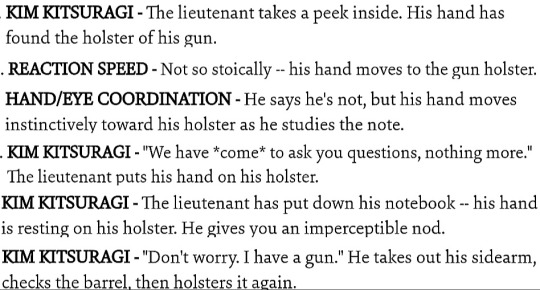
So, Kim reaches for his gun often. Very often. sometimes for the most ridiculous reasons- opening the bear fridge, the experiment in the church, a note from Klaasje.

This one is just from being anxious going into the communist reading group. Kim doesn't want to be the kind of cop who draws his gun constantly, who shoots instinctively, but he is, or at the very least it's very difficult for him to stop himself from becoming one.
Perhaps the most horrifying example is with The Pigs-
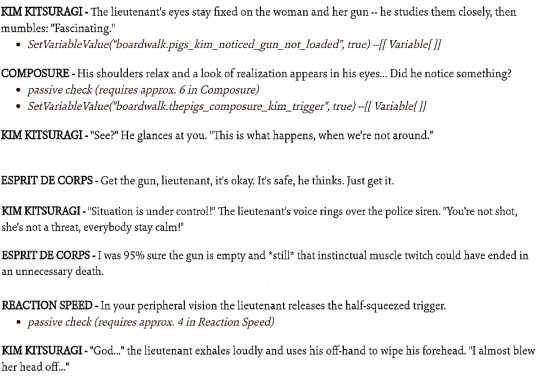
Even if he KNOWS the gun isn't loaded, even if he knows it's safe, the instinctual muscle twitch could have ended in an unnecessary death. Kim is very well aware of that fact, and it's horrifying to him. @shufflerock-jam has this really good post about it, where they wonder how many of Kim's kills were unnecessary. "Something about a pair of traumatized cops, one fighting against shooting himself and one fighting against shooting everyone else".
At the end of The Pigs exchange, if Harry says she tried to kill him, Kim begins to interject, but stops himself and agree this situation could've been very bad. Then Empathy chimes in- 'He's trying not to think about how bad it could have been had the gun been loaded.' Which is the heart of the issue, right? that leads us to Eyes-
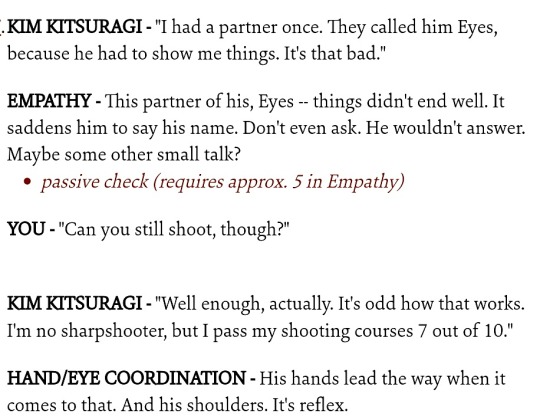
This is such a fascinating background to give Kim as a character- not just losing his partner, which gives him the trauma and survivor's guilt that lead to this unhealthy relationship with his gun and frankly with death in general, but losing his Eyes, and having that not interfere with his shooting. Kim doesn't need to see well to hit, he doesn't need to think. It's all in his hands, a reflex. A reflex that nearly took an innocent life. That might have taken one before.
His awareness of looming danger, to him and to his partner, is fueling his version of Hand/Eye Coordination to have him constantly on edge, his whole body is like a loaded spring, always prepared to make sure it doesn't happen again. Then it does-


In his nightmare scenario, leaning over his partner's bleeding body, Kim only needs one word to shoot without a second's hesitation. He's never not ready to take that shot. He doesn't need his Eyes.
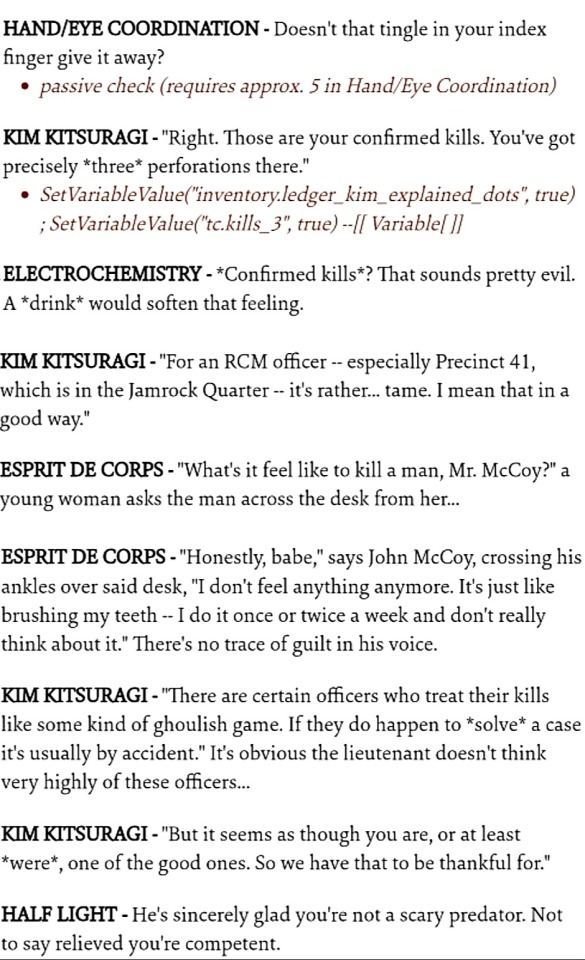
Harry is distraught to discover he's killed before- his body remembers it. He wants a drink to soften the feeling. Kim however is impressed with how little he's killed- especially coming from the bloody murder unit. He wants to be 'one of the good ones' (Kim's adamant belief in the possibility of a Good Cop is a whole other can of worms) the kind of cop he would think highly of. Kim is disgusted by cops who kill like it's a game. Espirit gives us a vision of a cop exactly like that, who kills so often it doesn't feel like anything anymore. In a way that is completely mechanical- no thought, no feelings, just a thing your body does. Not unlike the way Kim shoots- like a spring unloaded. Kim has 6 confirmed kills before the tribunal, double the amount Harry has. He doesn't react the same way though-
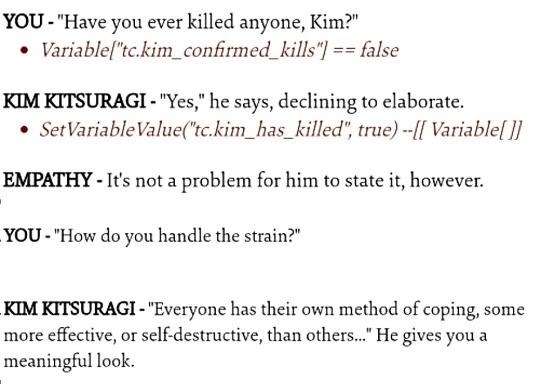
It's doesn't bother Kim that he has killed, even if he declines to elaborate on it, and he seems to frown upon (or worry about) Harry's destructive coping mechanism. If they're unable to save Ruby, he says "Control your emotions. We did our job. This won't be the worst thing that happens on this case… believe me. You can't let this break you." When you wake up after the tribunal, he doesn't dwell on the lost lives on either side. Harry's skills call him a killer, a bloodstained killer, but when he tells Kim he also killed he simply nods. He's smoking though. I'm not saying that Kim is heartless or careless, he's rattled by nearly blowing The Pigs' head off, very sorry for the lives lost during the case, and clearly hunted by death, having been surrounded by it for his entire life. But I do think death is a part of the job for him- not just possible civilian causalities, but his own potential death. He speaks plainly about how he might die in the lie of duty, and he narrowly avoided it more than once, with others dying in his place..

He walked into the line of fire with harry expecting for of them to die, and his quick fingers on the trigger made it so they lived another day. Even if more ghost joined the list that hunts him in his sleep, he is alive. He goes on. He can't afford to fix this habit, as much as he wants to.
So it's so horrible and so touching that when Dros asks "What have you done?" Kim says-

It's a tragedy, really. A wartime orphan who wanted to be a revolutionary pilot and played with Franconigerian knights, who grew up to be a cop, a job that slowly shapes his body into a killing machine. And when you ask what he does, what you both do, he says keep people alive.
#disco elysium#kim kitsuragi#harry du bois#disco Elysium meta#de#de analysis#de meta#this is so long and i'm sure it's been done a dozen times before but i'm new here and i can't stop thinking about it#goddamn this game#🏺#juha.txt
2K notes
·
View notes
Text
I’m thinking about the failed check to get Kim to dance, and. Even though Harry is a disaster bisexual, in many ways (at least on a good playthrough), Harry is a breath of fresh air. Like we talk a lot about Kim putting up with Harry, but Harry also, as his best self, helps Kim a lot by just letting him be himself instead of the impenetrable wall he has to be around.. everyone really, to be given respect. He whisks him away on his eccentric little journeys with his silly little mannerisms and just.. radically accepts Kim. Until he calls him a slur. And even if you apologize to him, it breaks that illusion. You can’t go back to being that for him.
He doesn’t even call Harry officer. He is more disappointed than angry, and self blaming even. He calls himself an idiot for not seeing it. He’s frankly heartbroken because he really likes you (whether you ship them or not because they can still grow very close either way). He let himself be vulnerable with you and you slammed the door in his face.
It hurts to only see how much Kim really cares about you when he’s walking away and it’s such good writing, and it’s so realistic as well. To feel like you’re in a safe place with your friends until it all goes south so quickly it makes your head spin
#disco elysium#kim kitsuragi#character analysis#harry dubois#there’s a little bit of harrykimanalysis i guess#but it’s not exclusive to that
117 notes
·
View notes